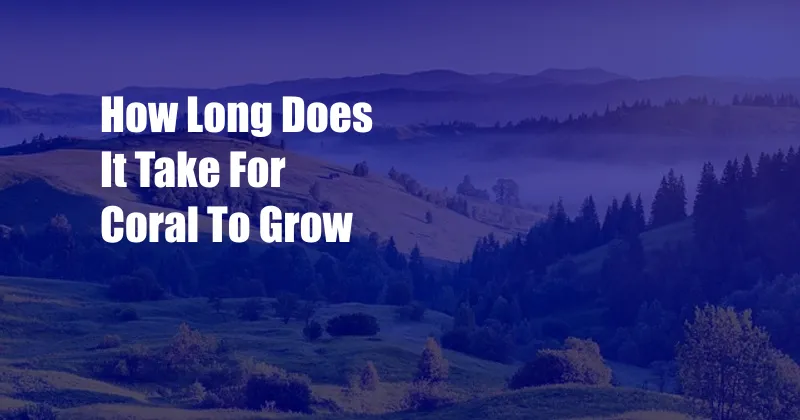
How Long Does It Take for Coral to Grow?
I remember the first time I saw a coral reef. I was on a snorkeling trip in the Caribbean, and I was amazed by the vibrant colors and intricate shapes of the coral. I had never seen anything like it before. I was so fascinated that I spent the rest of the trip exploring the reef, learning as much as I could about these amazing creatures.
One of the things I learned is that coral grows very slowly. In fact, it can take hundreds of years for a coral reef to reach its full size. This is because coral is not actually a plant, but an animal. Coral polyps are tiny creatures that secrete a hard exoskeleton made of calcium carbonate. Over time, these exoskeletons build up to form a coral reef.
The Rate of Coral Growth
The rate of coral growth depends on a number of factors, including the species of coral, the water temperature, and the availability of nutrients. In general, coral grows faster in warm, clear water with plenty of sunlight. Some species of coral can grow up to 10 centimeters per year, while others grow only a few millimeters per year.
Coral reefs are important ecosystems that provide food and shelter for a variety of marine life. They also help to protect coastlines from erosion. However, coral reefs are threatened by a number of factors, including climate change, pollution, and overfishing. Climate change is causing the ocean to become warmer and more acidic, which is making it difficult for coral to grow. Pollution can also damage coral reefs, and overfishing can reduce the number of fish that eat coral-eating animals.
Protecting Coral Reefs
There are a number of things that can be done to protect coral reefs. We can reduce our carbon emissions to help slow climate change. We can also reduce pollution by properly disposing of waste and using less fertilizer. We can also support sustainable fishing practices to help protect the fish that eat coral-eating animals.
Tips for Protecting Coral Reefs
Here are a few tips for protecting coral reefs:
- Reduce your carbon emissions: Drive less, use public transportation, and invest in renewable energy.
- Reduce pollution: Properly dispose of waste, use less fertilizer, and choose products that are not harmful to the environment.
- Support sustainable fishing practices: Buy seafood from sustainable sources and avoid eating fish that are endangered.
- Get involved in local conservation efforts: Volunteer to help clean up beaches and plant coral.
Frequently Asked Questions
Q: How long does it take for coral to grow?
A: The rate of coral growth depends on a number of factors, including the species of coral, the water temperature, and the availability of nutrients. In general, coral grows faster in warm, clear water with plenty of sunlight. Some species of coral can grow up to 10 centimeters per year, while others grow only a few millimeters per year.
Q: What are the threats to coral reefs?
A: Coral reefs are threatened by a number of factors, including climate change, pollution, and overfishing. Climate change is causing the ocean to become warmer and more acidic, which is making it difficult for coral to grow. Pollution can also damage coral reefs, and overfishing can reduce the number of fish that eat coral-eating animals.
Q: What can be done to protect coral reefs?
A: There are a number of things that can be done to protect coral reefs. We can reduce our carbon emissions to help slow climate change. We can also reduce pollution by properly disposing of waste and using less fertilizer. We can also support sustainable fishing practices to help protect the fish that eat coral-eating animals.
Conclusion
Coral reefs are amazing ecosystems that are home to a variety of marine life. They also help to protect coastlines from erosion. However, coral reefs are threatened by a number of factors, including climate change, pollution, and overfishing. We can all do our part to protect coral reefs by taking simple steps to reduce our carbon emissions, reduce pollution, and support sustainable fishing practices.
Would you like to know more about Coral Reefs?